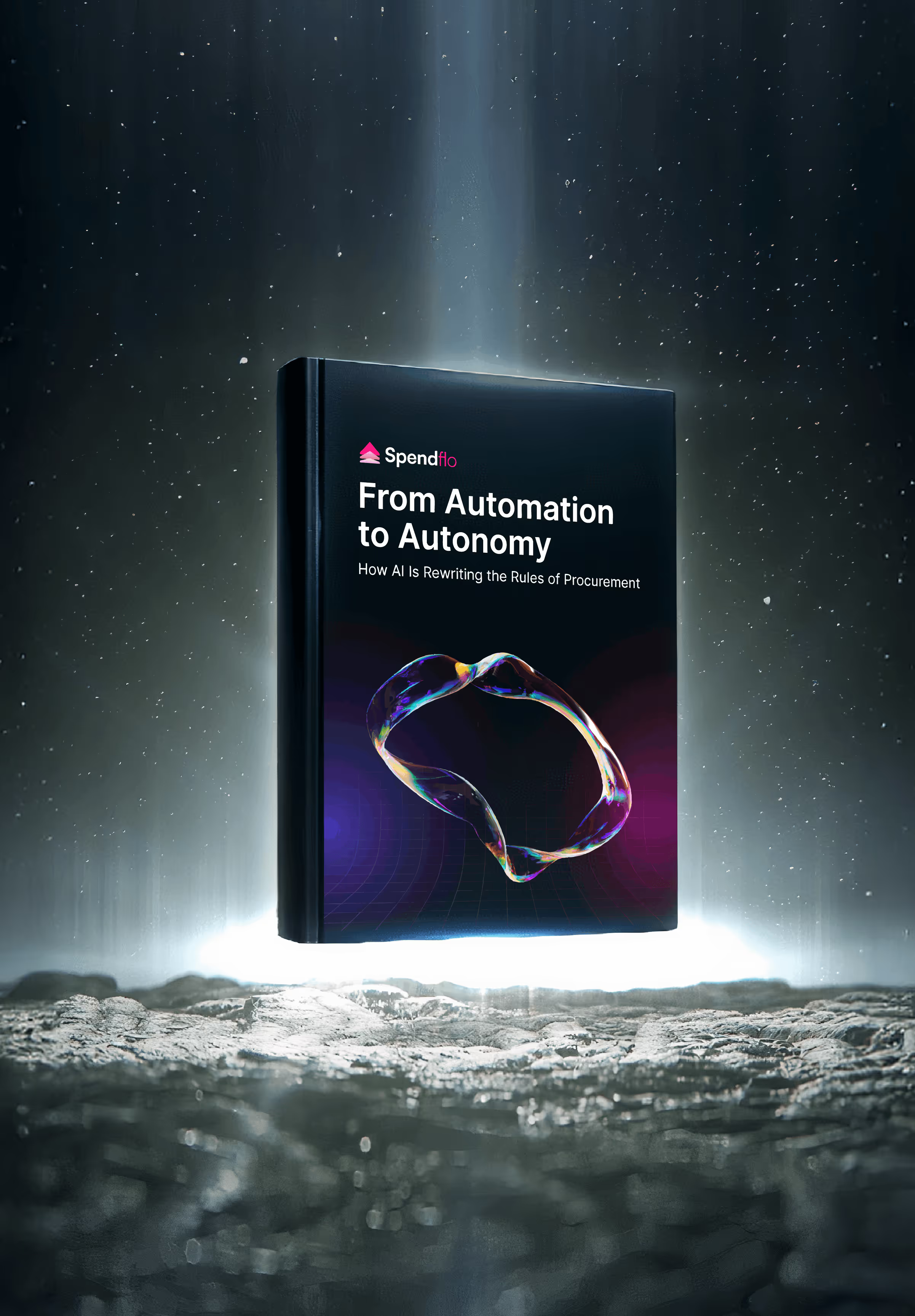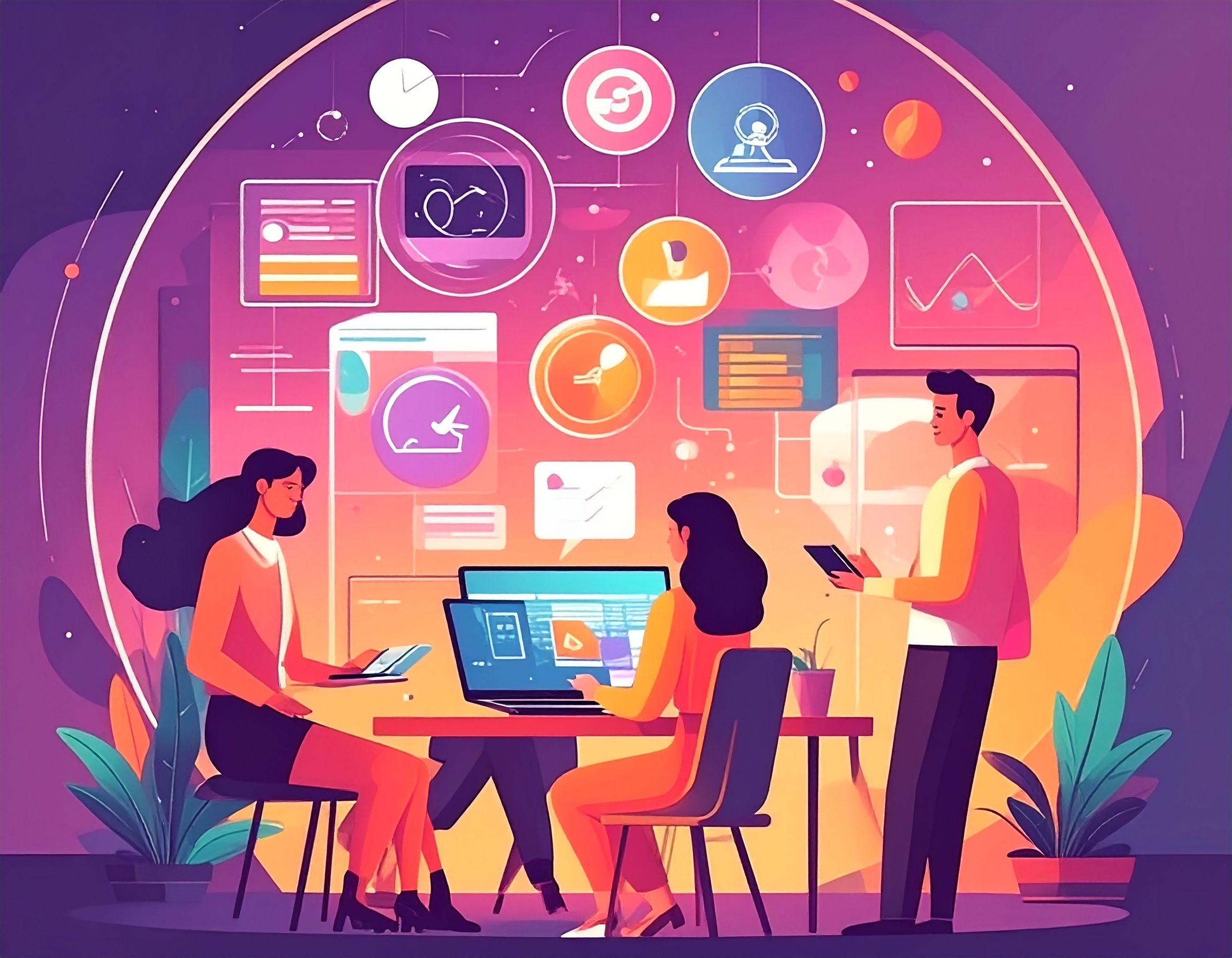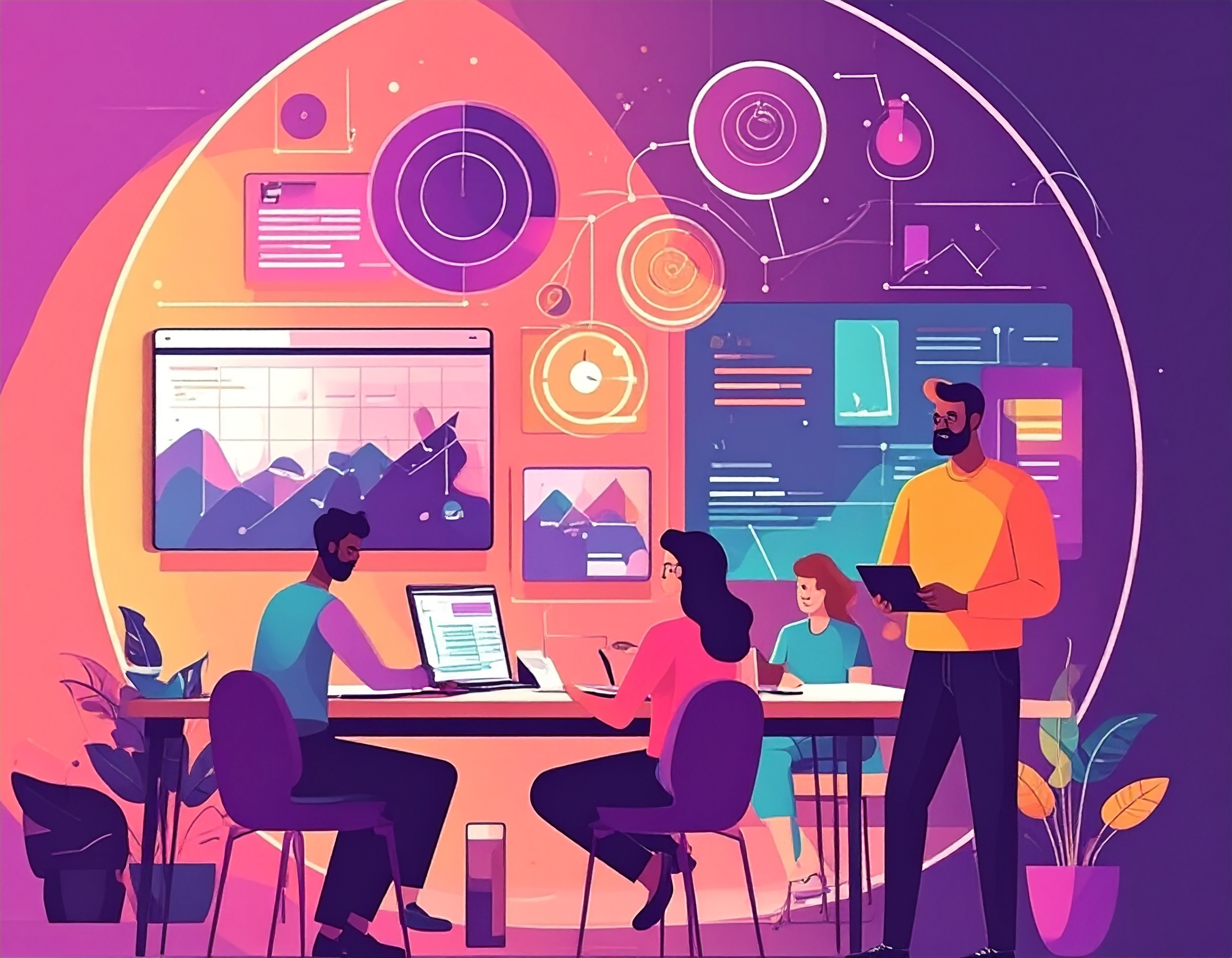

Artificial Intelligence (AI) In Procurement : Solutions & Examples

Artificial Intelligence (AI) In Procurement : Solutions & Examples
Explore how AI improves procurement efficiency through automation, data-driven insights, and risk mitigation. Learn key AI applications and best practices.


AI is transforming procurement through automatizing; enhancing decision-making and consolidating suppliers. On a larger scale, AI can be used by organizations to make informed decisions based on the data they have rather than focusing on how to optimize costs and reduce inefficiencies in their demand forecasting. The guide discusses the advantages, issues and best practices that should be undertaken when applying AI in procurement.
What is Artificial Intelligence in Procurement?
Artificial intelligence (AI) in procurement leverages advanced technology to automate, optimize, and enhance procurement tasks. It streamlines processes like supplier selection, spend analysis, and contract management, improving efficiency, accuracy, and enabling data-driven decision-making for better outcomes.
Examples of Procurement AI
AI is revolutionizing procurement by automating tasks, streamlining workflows, and providing data-driven insights. These tools enhance decision-making, reduce costs, and improve supplier management, enabling procurement teams to work more efficiently and strategically.
Here are examples of how AI is transforming procurement processes:
1. Spend Classification and Analysis
AI automates the classification of spend data, enabling organizations to quickly identify trends, optimize budgets, and uncover cost-saving opportunities across various categories of procurement.
2. Guided Buying
AI tools are capable of guiding employees to make purchases within company-approved suppliers and policies. This reduces off-contract spending and ensures compliance with procurement standards and budgetary policies.
3. Predictive Demand Forecasting
AI uses historical data and market trends to accurately forecast demand, ensuring businesses can optimize inventory, prevent stockouts, prevent stockouts, and avoid excess inventory, reducing operational costs.
4. Automated Contract Analysis
AI automates the process of reviewing contracts, identifying risks, ensuring compliance with regulations, and suggesting opportunities for renegotiation or improvement in terms.
5. Anomaly Detection in Invoices & Payments
AI detects irregularities or anomalies in invoices and payment transactions, reducing financial errors, preventing fraud, and ensuring accurate financial reporting.
6. Supplier Risk Assessment
AI evaluates suppliers by analyzing performance metrics, financial stability, and risk factors. This allows businesses to select reliable suppliers and minimize disruptions in the supply chain.
7. Purchase Pattern Analysis
AI analyzes purchasing behaviors and patterns to optimize procurement strategies, ensuring that procurement decisions are aligned with business goals and helping reduce unnecessary spend.
8. Automated Compliance
AI ensures that all procurement processes comply with internal policies and external regulations. This helps businesses to avoid penalties and reduce the risk of non-compliance.
9. Automated Purchase Order Processing
AI streamlines the purchase order process from requisition to payment, reducing manual errors, speeding up approvals, and ensuring that orders are processed quickly and efficiently.
10. AI-based Spend Analysis
AI tools offer real-time insights into spending patterns, organizations identify inefficiencies, optimize supplier contracts, and improve cost management across all procurement categories.
Types of Procurement AI
The types and capabilities of AI technologies transforming procurement can be different. The technologies allow making workplaces more efficient, easy to make decisions and reduce the use of manual work in favor of greater efficiency, strength, and savings.
1. Artificial Intelligence (AI)
AI refers to the process involved in smart systems that may simulate the decisions of humans in order to automate the operations of procurement, such as spend analysis, the selection and contract management of suppliers. This improves accuracy but reduces the human input.
2. Machine Learning (ML)
ML algorithms can base predictions and identify trends and optimization in the decision-making process using past procurement data. To illustrate, ML in procurement can forecast delivery delays of suppliers based on their past performance and external threats.
3. Natural Language Processing (NLP)
NLP will allow procurement systems to understand and learn human language. This enables faster contract processing, smarter communication with suppliers and automation of the text-heavy processes like processing invoices.
4. Robotic Process Automation (RPA)
RPA automates repetitive tasks that have a rule element such as creation of purchase orders, invoice matching and data entry. This reduces errors and companies have procurement employees who are free to work more and do work that is more valuable.
5. Applications to Deep Learning (DL).
Deep learning models are used to process large and complex data to detect subtle patterns. Procurement DL can use cases to identify fraudulent invoices, predict demand shifts using unstructured data, or supplier sentiment based on market news.
6. The use of agentic AI in Autonomous Procurement Decisions.
The third frontier is agentic AI systems and these can source, negotiate and even sign contracts on predefined guardrails. To illustrate this point, a SaaS agent can be trained to renew the contract at the optimal price automatically without the interference of a human.
7. Cognitive Procurement and Cognitive Analytics.
Cognitive procurement envisions AI and advanced analytics in conjunction in order to replicate a human thought process. These systems are capable of evaluating various variables such as supplier risk, pricing standards, and ESG scores before making and enforcing procurement strategies.
8. Invoice Processing Word Embedding Models.
The models of word embedding (Word2Vec or BERT) can improve the text recognition during invoices and contracts reading. This aids the AI systems to standardize the invoice conditions of the vendors, detect anomaly, and accelerates the automation of accounts payable.
9. Guided Applications on Learning with Procurement Data.
Labelled procurement data (e.g., past vendor ratings, contract results) are used to train models during supervised learning. One of the practical uses cases is to predict the suppliers that are likely to default or those that will probably have a threat of compliance.
Benefits of AI in Procurement
AI in procurement offers numerous advantages, from streamlining operations to improving decision-making. It enhances efficiency, reduces costs, mitigates risks, and provides scalable solutions that continuously improve as they learn from data.
Here are some important benefits of AI in procurement:
1. Increased Efficiency
AI automates repetitive tasks such as purchase order creation and invoice matching, reducing manual workloads. This enables procurement teams to focus on higher-value activities, resulting in faster, more efficient processes.
2. Enhanced Decision-Making
AI leverages data-driven insights to help procurement teams make informed decisions. From supplier selection to spend analysis, AI improves accuracy and ensures strategic, data-backed choices.
3. Cost Savings
AI identifies inefficiencies, reduces unnecessary spending, and negotiates better supplier contracts. By optimizing procurement workflows, it helps organizations achieve significant cost reductions.
4. Risk Mitigation
AI enhances risk assessment by identifying potential risks in supplier relationships, contract terms, and compliance, allowing organizations to proactively manage and mitigate procurement-related risks.
5. Scalability and Adaptability
AI solutions are highly scalable, easily adapting to the growing and evolving needs of procurement teams. Whether dealing with more suppliers or larger data sets, AI can adjust to handle the increased complexity.
6. Continuous Improvement
AI systems continuously learn and improve from past data, refining procurement processes. This enhances accuracy and efficiency over time as they process more data and adjust to changing conditions.
AI Implementation Framework Strategies
Introducing AI to procurement cannot be successful without more than implementing new tools; it demands a coherent system that integrates AI into all steps of the procedure. Below are key strategies:
1. Cross-Functional Cooperation with AI in the Middle of the Road.
The integration of AI is most successful when finance, procurement, IT, and legal teams work together based on common information and goals. To illustrate, AI-powered dashboards can be used to deliver one source of truth so that all stakeholders can view real-time spend visibility and supplier performance data.
2. AI-Based Change Management Approaches.
The AI-specific steps that should be involved in change management are pilot testing, phased rollouts, and the onboarding of employees through AI-enabled simulations of training. Integration of AI into everyday operations can make employees adjust without any opposition.
3. Ongoing AI Surveillance Systems.
AI models are constantly evaluated to be effective. Procurement teams are required to provide monitoring procedures that will monitor accuracy, bias and drift in performance. As an example, anomaly detection by AI can attract attention to the situation when it is observed that spend patterns have changed rapidly, and human oversight is necessary.
4. AI Governance in Procurement.
Good governance will make the use of AI responsible. It involves developing policies regarding data privacy, ethical procurement, and AI-driven procurement decision explainability. The compliance with such regulation as GDPR or CCPA can be evidenced with the help of AI audit trails.
5. Artificial Intelligence Training and skills gap assessment.
The leaders of procurement must frequently evaluate the capability of teams to handle AI tools. Individual training programs, e.g. practical workshops with AI-based sourcing systems, can support the bridging and make sure that the teams utilize the technology in a proficient manner.
Challenges of AI in Procurement
While AI brings numerous benefits to procurement, it also presents challenges. These include ensuring data quality, managing change, integrating AI with existing systems, and owning or building necessary skills to leverage AI effectively.
Here are some of the main challenges that you could encounter with AI in procurement:
A) Data Quality and Availability
The AI is as good as the data it is operating on. In procurement, data quality and access gaps may cause serious constraints in predication and recommendations. Common challenges include:
1. Incomplete Data
Many procurement systems lack fields and the records about the vendors are old or there are inconsistencies with the contract. These shortcomings lower the accuracy of AI-based spend analysis and predictions.
2. Inconsistent Data Formats
The procurement information is usually in various forms, ERPs, P2P, supplier portals, and spread sheets. Without standardisation, AI tools will be unable to put this information together and analyse it.
3. Duplicate and Redundant Records.
AI outputs can be manipulated using multiple versions of a vendor, contract, or purchase order. Indicatively, duplicate vendors may over declare the expenditure or skew the performance ratings of suppliers.
4. Limited Historical Data
AI models are better when provided with time-series data. The inability of the system to attract patterns and make decent predictions is also limited by the inability to obtain historical procurement data (pricing history or contract renewal).
5. Real-Time Data Gaps
AI relies on real-time information. Late updates of approvals, supplier performance, or spend insights can result in the procurement teams missing critical risks or opportunities.
6. Information Confidentiality and integrity.
Sensitive procurement data is usually held in siloed systems because of safety or legal concerns. Without safe and yet smooth access, AI tools may be operating on an incomplete list of data, which reduces its usefulness.
B) Change Management
Implementing AI in procurement requires significant organizational change. Resistance from employees, lack of understanding, and the need for new workflows can slow down adoption and reduce the impact and effectiveness of AI solutions.
C) Integration with Existing Systems
The implementation of AI in procurement can only be effective when the technology is connected to the existing systems such as ERPs, P2P platforms, and vendor management tools. Silos, duplications, and limited data are frequent results of poor integration which makes the value AI is supposed to bring irrelevant. The major integration issues involve:
1. System Compatibility with Legacy Systems.
A good number of the procurement teams continue to use old versions of ERP or P2P systems that do not have current APIs. To interface AI tools with these platforms, it may need expensive customization or middleware, impeding adoption.
2. Data Fragmentation
The procurement data usually exists in many systems, such as the finance systems, IT systems, legal system, and supplier portals. Absent adequate integration, AI can overlook important context or draw in inconsistent data resulting in inaccurate analytics.
3. Real-Time Synchronization
AI is effective with live data. Any delays in integrating purchase orders, approvals, or supplier databases on platforms may hamper AI providing the correct recommendations or timely risk warning.
4. Security and Compliance Risk.
The combination of AI and the current systems also creates new security concerns. To illustrate, the cross-platform synchronization of sensitive data on vendors or contracts is to be conducted in line with GDPR, CCPA, or ISO 27001.
5. User Adoption and Workflow Disruption.
The workflow design is the key factor that can irritate users even in case the technical integration is effective. Unless the AI tool integrates into their everyday systems, the procurement teams might resort to manual operations.
D) Skills and Expertise
Procurement AI: Successful implementation isn’t simply about the technology, it’s about the people and principles. Procurement teams should develop new skills in such areas as data science, training AI models, and analytics. Even the best and high tech tools cannot perform without the appropriate expertise.
E) Ethical & Legal Challenges
At the same time, AI adoption introduces ethical and legal challenges that cannot be ignored:
1. Bias in AI models
Algorithms trained on incomplete or biased data may unfairly disadvantage certain suppliers.
2. Data privacy and Compliance
Procurement teams must ensure that AI-driven processes comply with regulations such as GDPR, CCPA, or sector-specific standards.
3. Transparency and Accountability
Decisions made by AI need to be explainable, especially when they influence vendor selection or contract negotiations.
Key Applications of AI in Procurement
AI has long since passed the stage of mere automation, now it is making sourcing smarter, negotiations sharper, and supply chains more resilient. Through incorporation of intelligence in each of the procurement lifecycle, the organizations are able to enhance efficiency, minimize risks and optimize savings. The following are the main spheres, in which AI is transforming procurement today:
1. Spend Analysis and Cost Optimization.
AI-driven analytics solutions process immense amounts of procurement data in real time and find inefficiencies and concealed saving opportunities. As an illustration, AI dashboards help companies to eliminate redundant SaaS subscriptions or unused licenses, allowing finance leaders to reduce costs by as much as 30 percent.
2. Supplier Selection and Management.
AI will judge the suppliers by their performance metrics, risk analysis and past reliability. As an example, a technology company headquartered in a global location can rank suppliers based on delivery speed and environmental sustainability, and it becomes simpler to focus on sustainable and robust supplier relationships.
3. Contract Management
AI will review the contracts automatically, pointing out non-compliance, unfavorable clause, and renewal risks. As an illustration, the platforms may identify contracts where the auto-renewal is not present or the data protection is not mentioned, giving the procurement teams time to renegotiate before it is late.
4. Inventory Optimization and Demand Forecasting.
AI can be used to determine future inventory needs with high accuracy by examining historical demand and market variations. A retailer, say, is able to see seasonal peaks in demand and structure procurement in line with them- preventing stockouts and expensive overstocking.
5. Risk Management
Risk engines, which are propelled by AI, look at supplier health, financial exposure, and regulatory compliance. An example is when manufacturers track their suppliers to go out of business or other geopolitical factors and keep their supply chains intact through AI.
6. Semi-Automated Sourcing Operations.
AI simplifies the process of creating the RFP, shortlisting the vendors, and lessening the manual workload. Indicatively, an AI procurement team can automatically produce vendor scorecards and shortlist candidates on pricing, delivery speed, and certifications, reducing sourcing cycles down to days.
7. AI-Based Negotiation strategies.
Artificial intelligence applications review previous transactions and the actions of a vendor to suggest a negotiation strategy. To take the example, prior to negotiating with vendors, procurement chiefs can be presented with AI-driven recommendations on price or contract conditions, and this posture is enhanced at the table.
8. Procurement Orchestration and Intake Management.
AI coordinates procurement procedures between intake and purchase order. An automated Intake-to-Procure platform, as in the case of Spendflo, is used to direct employees through requests, approvals, and compliance checks; providing procurement teams with complete transparency and eliminating bottlenecks.
9. Smartly Personalized Market Intelligence.
The AI refines customized market data based on supplier databases, prices and industry trends. To illustrate, a SaaS-intensive business will be alerted on any changes in vendor pricing or new compliance regulations to enable procurement departments to change strategies on-the-fly.
10. Sustainable Procurement (in embedded form).
AI assists in incorporating ESG standards in procurement. As an example, the procurement teams are able to automatically identify suppliers with a low sustainability score and focus in suppliers that are focused on renewable energy or considerate of labor practices.
11. Autonomous End-to-End Sourcing.
In the future, AI is headed towards full autonomous sourcing. Early adopters are testing systems capable of determining requirements, sourcing vendors, negotiating, and signing contracts with little human involvement so as to be fast and also consistent across procurement cycles.
Procurement AI Software Solutions
Common Misconceptions of AI in Procurement
There are several misconceptions about AI in procurement, leading to hesitation in adoption. In reality, AI complements procurement professionals and can deliver significant ROI. By automating routine tasks, AI allows procurement teams to focus on more strategic initiatives and innovation.
Let us look at some common myth about AI in procurement and debunk them:
1. AI will replace procurement professionals
Contrary to popular belief, AI won’t replace procurement teams. Instead, it automates repetitive tasks, allowing professionals to focus on strategic decisions like supplier negotiations and relationship management, enhancing overall procurement efficiency.
2. Predictive Procurement Orchestration has a lengthy implementation time
While implementing AI may seem complex, modern AI solutions offer fast integration, especially when deployed in phases. Companies can start seeing initial results within weeks or months, not years.
3. ROI might come after years
AI delivers measurable ROI faster than expected. With optimized procurement processes and cost savings, businesses often see clear benefits within a few months, significantly improving procurement efficiency and cost control.
4. ERP is the only platform you need
ERPs handle broad business processes, but AI brings advanced analytics, automation, and insights specifically for procurement. This makes it a valuable addition to optimize purchasing and supplier management.
5. Suppliers don’t want to learn a new tool
Many suppliers embrace AI-driven procurement platforms as they simplify processes, automate workflows, and reduce paperwork. This way, interactions become more efficient and beneficial for both parties.
Best Practices for Implementing Procurement AI
To ensure successful AI implementation in procurement, businesses should follow best practices that ensure smooth integration, data quality, and change management. These steps will help procurement teams to fully harness AI’s potential for maximum impact.
Here are some best practices for implementing procurement AI:
1. Define clear goals
Establish specific and measurable objectives for AI implementation, such as reducing procurement cycle times, improving supplier selection, or optimizing spend analysis to measure the success of your AI initiative.
2. Start with a small pilot project
Begin with a small, focused area of procurement, like invoice processing or spend analytics. This allows you to test the effectiveness of AI, learn from initial results, and refine before scaling.
3. Ensure data quality and volume
AI relies on accurate and clean data well-organized, comprehensive, and free of inconsistencies before deploying AI solutions.
4. Bring in key stakeholders
Engage key stakeholders, including procurement, IT, finance, and senior leadership, early in the process to secure buy-in and ensure alignment early in the process.
5. Integrate with existing systems
Ensure that your AI tools integrate smoothly with existing procurement and ERP systems, allowing data to flow seamlessly between platforms without disrupting current workflows.
6. Provide training and change management
Offer training programs to help your procurement team understand and use AI tools effectively. Manage the organizational shift by addressing concerns and ensuring smooth adoption across teams.
7. Keep it ethical and secure
Focus on the ethical use of AI in procurement, ensuring transparency, data security, and compliance with relevant regulations to build trust both internally and with external suppliers.
Case Studies and ROI of Procurement AI
AI in procurement delivers measurable business impact from cost savings to compliance improvements. Below are real-world examples and frameworks that show how organizations are applying AI successfully.
A) Real-World Case Studies
1. Tech SaaS Enterprise: A Series C startup integrated 80+ SaaS vendors onto the AI-native platform of Spendflo to consolidate them, automate renewals, and negotiate prices, saving it $500K/year.
2. Healthcare Provider: Implemented AI-based invoice anomaly detection to identify duplicated bills. It thwarted one hundred and fifty thousand dollars of fraudulent payments within three months.
3. Retail Giant: Used AI forecasting tools to optimize season inventory. This improved stock outs in high seasons and decreased the overstock by 15 percent annually.
B) Industry Benchmarks and Statistics
1. 30% SaaS Procurement Spend Savings: It is estimated that with the help of AI-powered SaaS procurement platforms such as Spendflo, companies are guaranteed up to 30% savings on their vendor spend.
2. 2-3x ROI: According to a survey by Deloitte (2024), during the first 18 months of deploying AI, procurement teams experience an average 2-3x ROI.
3. 70% Spend Under Management: AI solutions have the potential to place 70 percent of enterprise spending under centralized visibility in 60 days.
C) ROI Calculations and Measurement Frameworks
Procurement leaders measure AI ROI by tracking:
- Cost Savings: % reduction in SaaS/vendor spend (before vs. after implementation).
- Time Savings: Hours saved by finance/procurement staff (e.g., Spendflo customers recover ~4 hours per finance user weekly).
- Risk Reduction: Drop in compliance violations or supplier disruptions.
- Process Efficiency: Reduced cycle time for POs, approvals, or supplier onboarding.
Example ROI Framework:
ROI (%) = (Total Savings + Time Value Saved + Risk Mitigation Value – AI Implementation Costs) ÷ AI Implementation Costs × 100
D) Regulatory Compliance Considerations
AI-driven procurement tools also strengthen compliance:
- Contract Compliance: Automated contract scanning ensures adherence to GDPR, HIPAA, and industry regulations.
- Supplier Risk Audits: AI models monitor supplier ESG scores, data privacy policies, and financial health.
- Audit Trails: Platforms like Spendflo provide AI-generated audit logs, ensuring traceability for regulators and internal governance.
Future of Procurement with AI
The future of procurement will be heavily shaped by advancements in AI. From predictive analytics to blockchain integration, AI will revolutionize procurement processes. Businesses will be able to make smarter, faster, and more secure decision-making.
Here are some key advancements AI will bring to procurement:
1. Advanced Analytics
AI will continue to improve predictive and prescriptive analytics, allowing procurement teams to identify spending patterns, forecast demand, and optimize supplier relationships for better decision-making.
2. Intelligent Automation
AI automates procurement tasks such as contract negotiations, supplier onboarding, and invoice matching. This enables faster decision-making and reduces manual workloads across the procurement process.
3. Conversational AI
AI-powered chatbots will enhance supplier and internal communications, providing real-time assistance, answering queries, and automating interactions to improve procurement workflows and communication efficiency.
4. Blockchain Technology
The combination of AI and blockchain in procurement will bring greater transparency and security to procurement transactions, ensuring that data is immutable, traceable and tamper-proof, reducing the risk of fraud and compliance issues.
Future-Ready Procurement with AI
AI is not a fad, it is defining the future of procurement. Companies can achieve the speed and visibility it takes to compete by adopting automation, data-conducted decision-making, and cost optimization. The trick is how to address the issues of data quality and integration and make procurement more agile and future-proof through best practices.
When you are willing to streamline the procurement process and save guaranteed money, such AI-native solutions as the Spendflo AI-based platform can assist you in centralizing the data on the vendors, automate approvals and achieve up to 30 percent savings on SaaS and vendor spend.
Ready to see how AI can transform your procurement process? Get a free savings analysis with Spendflo.
Frequently Asked Questions on AI in Procurement
What is Artificial Intelligence in Procurement?
AI in procurement refers to applying advanced technologies like machine learning, robotic process automation, and data analytics to streamline procurement activities, improve decision-making, and optimize supplier management. It enhances efficiency, reduces costs, and mitigates risks.
What are the main benefits of AI in procurement?
AI enhances procurement by automating repetitive tasks, providing real-time insights into spend, and improving decision-making. It helps organizations reduce costs, optimize supplier relationships, streamline contract management, and increase overall efficiency, allowing procurement teams to focus on strategic tasks.
How can AI be integrated into procurement systems?
AI can be integrated into existing systems like ERPs through specialized tools that offer automation, data analytics, and process optimization. Businesses should ensure seamless integration with current workflows, allowing AI to enhance spend analysis, supplier management, and contract handling without disruption.
What challenges should businesses expect when implementing AI?
Common challenges include maintaining data quality, achieving seamless integration with legacy systems, and overcoming employee resistance to change. Organizations must address these issues with proper data management, technical support, and comprehensive change management strategies to ensure successful AI implementation.
Will AI replace procurement professionals?
AI will not replace procurement professionals but will complement their work automating routine tasks and providing data-driven insights. This allows procurement teams to focus on higher-level strategic tasks like supplier negotiations, risk management, and long-term planning, enhancing their overall effectiveness.
How does AI improve supplier management?
AI analyzes supplier performance based on various factors like delivery times, quality, and compliance. This enables procurement teams to make informed decisions when selecting suppliers, manage relationships more effectively, and reduce risks like underperforming suppliers or disruptions in supply chain.
Is AI expensive to implement in procurement?
While AI implementation may require an upfront investment, the long-term benefits often outweigh the costs. AI-driven procurement solutions reduce manual work, optimize spending, and improve decision-making, resulting in substantial cost savings, increased efficiency, and strong return on investment.










.png)




.png)










.avif)





